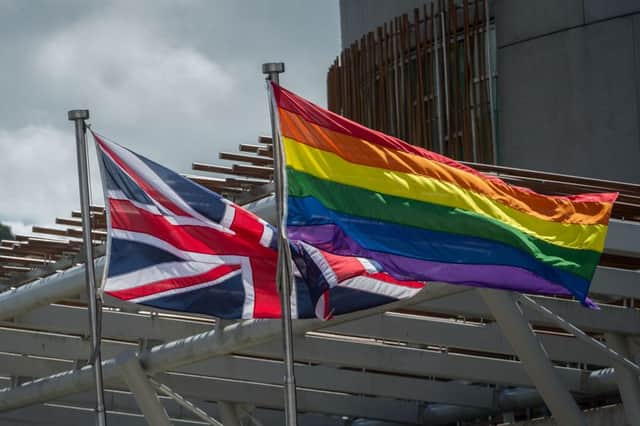Churches must tackle '˜bigots' over LGBT teaching in schools


The Rev. John Nugent, of Saint Fergus Church in Wick, claimed a lack of LGBT inclusive education is a breach of children’s rights, and faith communities should be more accepting of LGBT young people.
A recent report found 90 per cent of LGBT people experience homophobia while at school in Scotland, and 27 per cent reported they had attempted suicide once due to being bullied.
Advertisement
Hide AdAdvertisement
Hide AdThe challenging environment some LGBT pupils face in the classroom is in contrast to evolving attitudes among Scots more generally.
The proportion of people who say that they would be unhappy if a close relative married someone of the same sex almost halved from 30 per cent in 2010 to 16 per cent in 2015, according to the 2016 Scottish Social Attitudes (SSA) survey.
The number who say they would be unhappy if a relative married someone who has undergone gender reassignment surgery has fallen from around a half to just under a third over the same period.
The minister is supporting the Time for Inclusive Education (TIE) campaign, which is lobbying the Scottish Government to introduce a programme of LGBT inclusive education into all Scottish schools as part of a new national approach to tackle high rates of prejudice based bullying.
Nugent said: “I believe that all inhabitants of our planet have rights that go along with being human.
“One of those rights grants an education which will further the individual’s development so that she or he can grow into full personhood. Denial of that right is therefore unconscionable. Inclusive education is crucial to the full development of the individual and denying access to inclusion is tantamount to a denial of human rights.
“Schools and other places of education, faith centres and youth organisations are the appropriate loci for this. If our young people grow in an inclusive atmosphere then gradually bigotry, prejudice and bullying will end. In this sense the LGBTI community has led the way ahead of faith communities - which should be inclusive, but sadly aren’t.”
Nugent joins other faith leaders including Reverend Kelvin Holdsworth of the Scottish Episcopal Church and Islamic scholar Amanullah De Sondy in supporting the campaign and speaking out against prejudice towards LGBT people within faith communities.
Advertisement
Hide AdAdvertisement
Hide AdHe said: “Inclusivity lies in the DNA of faith. The founders of the great faith traditions left the door open to all, and it is this ancient path that must be reclaimed and promoted; the faith agenda then being seized back from the bigots and the haters. Idealistic? Maybe, but it is a goal that is worth pursuing - and it is a noble goal which we have to pursue for the sake of our young people.”
Campaigners from TIE met with Education Secretary John Swinney last October to discuss their proposals for LGBT issues, such as same-sex families and the history of the LGBT rights movement, to be included in curricular guidance and for teachers to be trained on how to address the topic in the classroom.
A Scottish Government spokeswoman said: “Local authorities and schools decide how to deliver the curriculum based on local needs and circumstances.
“History is an area of the curriculum which provides opportunities to study a wide range of people and historical events, and diversity is important within that, ensuring that pupils develop a nuanced, balanced, informed understanding of past people and events.
“Teachers use their professional judgement to select which historical periods and people to study.”